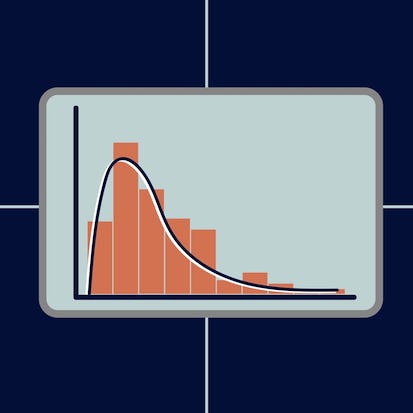- Level Professional
- Duration 30 hours
- Course by University of California, Santa Cruz
-
Offered by

About
This is the second of a two-course sequence introducing the fundamentals of Bayesian statistics. It builds on the course Bayesian Statistics: From Concept to Data Analysis, which introduces Bayesian methods through use of simple conjugate models. Real-world data often require more sophisticated models to reach realistic conclusions. This course aims to expand our "Bayesian toolbox" with more general models, and computational techniques to fit them. In particular, we will introduce Markov chain Monte Carlo (MCMC) methods, which allow sampling from posterior distributions that have no analytical solution. We will use the open-source, freely available software R (some experience is assumed, e.g., completing the previous course in R) and JAGS (no experience required). We will learn how to construct, fit, assess, and compare Bayesian statistical models to answer scientific questions involving continuous, binary, and count data. This course combines lecture videos, computer demonstrations, readings, exercises, and discussion boards to create an active learning experience. The lectures provide some of the basic mathematical development, explanations of the statistical modeling process, and a few basic modeling techniques commonly used by statisticians. Computer demonstrations provide concrete, practical walkthroughs. Completion of this course will give you access to a wide range of Bayesian analytical tools, customizable to your data.Modules
Module Overview
1
Videos
- Course introduction
1
Readings
- Module 1 assignments and materials
1. Statistical Modeling
1
Assignment
- Lesson 1
1
Discussions
- Statistical modeling process
2
Videos
- Objectives
- Modeling process
2. Bayesian Modeling
1
Assignment
- Lesson 2
4
Videos
- Components of Bayesian models
- Model specification
- Posterior derivation
- Non-conjugate models
1
Readings
- Reference: Common probability distributions
3. Monte Carlo Estimation
1
Assignment
- Lesson 3
4
Videos
- Monte Carlo integration
- Monte Carlo error and marginalization
- Computing examples
- Computing Monte Carlo error
1
Readings
- Code for Lesson 3
Background for Lesson 4
1
Readings
- Markov chains
Markov Chains
1
Assignment
- Markov chains
Module Overview
1
Readings
- Module 2 assignments and materials
4. Metropolis-Hastings
1
Assignment
- Lesson 4
4
Videos
- Algorithm
- Demonstration
- Random walk example, Part 1
- Random walk example, Part 2
1
Readings
- Code for Lesson 4
JAGS
2
Videos
- Download, install, setup
- Model writing, running, and post-processing
2
Readings
- Alternative MCMC software
- Code from JAGS introduction
5. Gibbs Sampling
1
Assignment
- Lesson 5
3
Videos
- Multiple parameter sampling and full conditional distributions
- Conditionally conjugate prior example with Normal likelihood
- Computing example with Normal likelihood
1
Readings
- Code for Lesson 5
6. Assessing Convergence
1
Assignment
- Lesson 6
2
Videos
- Trace plots, autocorrelation
- Multiple chains, burn-in, Gelman-Rubin diagnostic
2
Readings
- Autocorrelation
- Code for Lesson 6
MCMC
1
Assignment
- MCMC
Module Overview
1
Readings
- Module 3 assignments and materials
7. Linear Regression
2
Assignment
- Lesson 7 Part A
- Lesson 7 Part B
6
Videos
- Introduction to linear regression
- Setup in R
- JAGS model (linear regression)
- Model checking
- Alternative models
- Deviance information criterion (DIC)
1
Readings
- Code for Lesson 7
8. ANOVA
1
Assignment
- Lesson 8
2
Videos
- Introduction to ANOVA
- One way model using JAGS
1
Readings
- Code for Lesson 8
9. Logistic Regression
1
Assignment
- Lesson 9
1
Discussions
- Why linear models?
3
Videos
- Introduction to logistic regression
- JAGS model (logistic regression)
- Prediction
1
Readings
- Code for Lesson 9
Multiple Factor ANOVA
1
Assignment
- Common models and multiple factor ANOVA
1
Readings
- Multiple factor ANOVA
Module Overview
1
Readings
- Module 4 assignments and materials
10. Poisson Regression
1
Assignment
- Lesson 10
3
Videos
- Introduction to Poisson regression
- JAGS model (Poisson regression)
- Predictive distributions
2
Readings
- Prior sensitivity analysis
- Code for Lesson 10
11. Hierarchical Modeling
2
Assignment
- Lesson 11 Part A
- Lesson 11 Part B
1
Discussions
- Selecting prior distributions
6
Videos
- Correlated data
- Prior predictive simulation
- JAGS model and model checking (hierarchical modeling)
- Posterior predictive simulation
- Linear regression example
- Linear regression example in JAGS
3
Readings
- Normal hierarchical model
- Applications of hierarchical modeling
- Code and data for Lesson 11
Mixture Models
1
Assignment
- Predictive distributions and mixture models
1
Videos
- Mixture model in JAGS
1
Readings
- Mixture model introduction, data, and code
Capstone Project
1
Peer Review
- Data Analysis Project
Course Conclusion
1
Videos
- Course conclusion
1
Readings
- Further reading and acknowledgements
Auto Summary
Join "Bayesian Statistics: Techniques and Models" on Coursera, a professional-level course in Data Science & AI. Led by expert instructors, this 1800-minute course builds on foundational Bayesian methods, introducing advanced models and MCMC techniques. Utilizing R and JAGS software, learners will master constructing, fitting, and assessing Bayesian models for various data types. Enroll with flexible subscription options: Starter, Professional, or Paid, and enhance your analytical skills with hands-on exercises and active learning experiences. Ideal for those with basic R knowledge seeking advanced Bayesian tools.

Matthew Heiner

